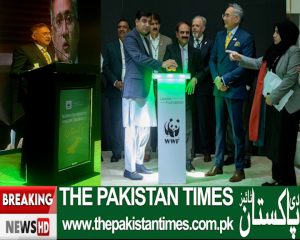 WWF Pakistan, with funding from the Laudes Foundation, launched the Pakistan Regenerative Production Environment Collaboration (RPLC) Pakistan to develop new business and farming practices that address the challenges faced by small farmers and address environmental challenges.
WWF Pakistan, with funding from the Laudes Foundation, launched the Pakistan Regenerative Production Environment Collaboration (RPLC) Pakistan to develop new business and farming practices that address the challenges faced by small farmers and address environmental challenges.
WWF Pakistan General Manager Hammad Naqi Khan, in his speech, said that this program will solve the long-term agricultural insecurity problems in Pakistan. He pointed out that agriculture faces serious problems such as excessive use of water, chemicals and pesticides, which affects the increasing crop and soil fertility due to climate change. This, he said, led to the issue of people becoming small farmers more equally. This program will promote collaborative activities to address these issues and create sustainable strategies to help farmers increase climate resilience and increase agricultural productivity.
Laudes Foundation Fashion Program Head Anita Chester said that Laudes Foundation is extremely pleased to launch RPLC in Pakistan, which supports the ecosystem for sustainable and innovative practices. We look forward to WWF Pakistan’s leadership in developing partnerships, encouraging collaboration with local actors, supporting farmers and communities to become financially self-sufficient, and empowering
communities towards positive business practices. Today, RPLC is expected to reach the whole world, more than one million hectares and more than 300,000 farmers. Particularly in Pakistan, this will cover 100,000 hectares and benefit more than 50,000 farmers. This approach has already made significant progress in many regions, including India, Brazil and Tanzania, demonstrating the scale of this approach.
Ghulam Muhammad Ali, chief guest and director of Pakistan Agricultural Research Council (PARC), in his speech, said that the project will help small-scale farmers and ranchers improve crop production and ‘earning capacity’. He added that this will benefit them as the use of fertilizers and pesticides will be significantly reduced through the integration of sustainable agricultural practices. He added that the main problems in crop production stem from pesticide use and soil fertility. He also emphasized the need to develop environmentally based solutions that will help reduce the negative effects of climate change and promote sustainable agriculture. He expressed his appreciation for the efforts of donors, implementers and partners in this process.
Climate change poses a major challenge to Pakistan’s economy, agriculture and natural resources. More than 1,700 people died in 2022 due to floods and monsoon rains. Solving these issues is an urgent need in Pakistan and requires governance and policy changes that address specific issues affecting different sectors.
Qadir Baksh Pirkani, Special Secretary for Agriculture, Government of Balochistan, stated that Balochistan has a great potential to contribute to agriculture despite challenges such as climate change, water scarcity, poor infrastructure and poor market access, and said that the province has an area of 3.47 million hectares. farmland. cultivated land. He emphasized the importance of investing in agriculture to reduce the effects of climate change and empowering poor farmers in sustainable agricultural practices. He also expressed his satisfaction with the work done and his determination to support sustainable agriculture.
Asad Imran, Director, Food and Markets, WWF-Pakistan, gave an overview of the project and said that this five-year program requires radical changes in the horticulture system that can further halt and reverse production loss due to land degradation and climate change. . To improve and renew the life of the soil, this project will improve the management and protection of water resources. Socially and economically, the income generation capacity of small farmers will be increased and their capacities will be improved by involving local women farmers in various activities.
Editor: Kamran Raja